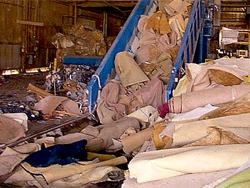Boulder's Carpet Recycling Program Canceled
The newspaper reported that a deal the city's Office of Environmental Affairs signed with the nonprofit Center for Resource Conservation in April allowed Boulder residents to bring in their old carpets to the center's recycling yards for free.
The reusable carpets went to Englewood-based All Recycling, which had a deal with a
But right around the time the deal was signed, a fire broke out at the
The city started collecting carpets — the majority of which were made of nylon 66. But the plant didn't get repaired, which left the city holding the shag.
As a result, the program was only recycling about 25% of the carpets it received. Without a place to recycle most of the carpets, it no longer made sense to keep accepting them, prompting the city to pull the plug.
Had the plant been able to process both kinds of nylon, Vasatka said, the city and its partners would have been able to keep 70% of carpets from getting tossed out.
"It would have been huge," she said.
The program generated lots of interest from homeowners who were remodeling their properties or replacing their floors, Vasatka said. More than 200 people came in to drop off their carpets.
Spenser Villwock, of the Center for Resource Conservation, said the pilot program showed that people are interested in recycling their carpet, and nonprofits and businesses are capable of processing them.
The missing link, he said, is enough demand for recycled carpets.
"It's something that definitely has potential for the future," he said. "There needs to be an industry that is able to process the material. Whether that comes through consumer demand for it — which would be ideal — or whether it comes through looking at some sort of legislation, that's what it's going to take."
